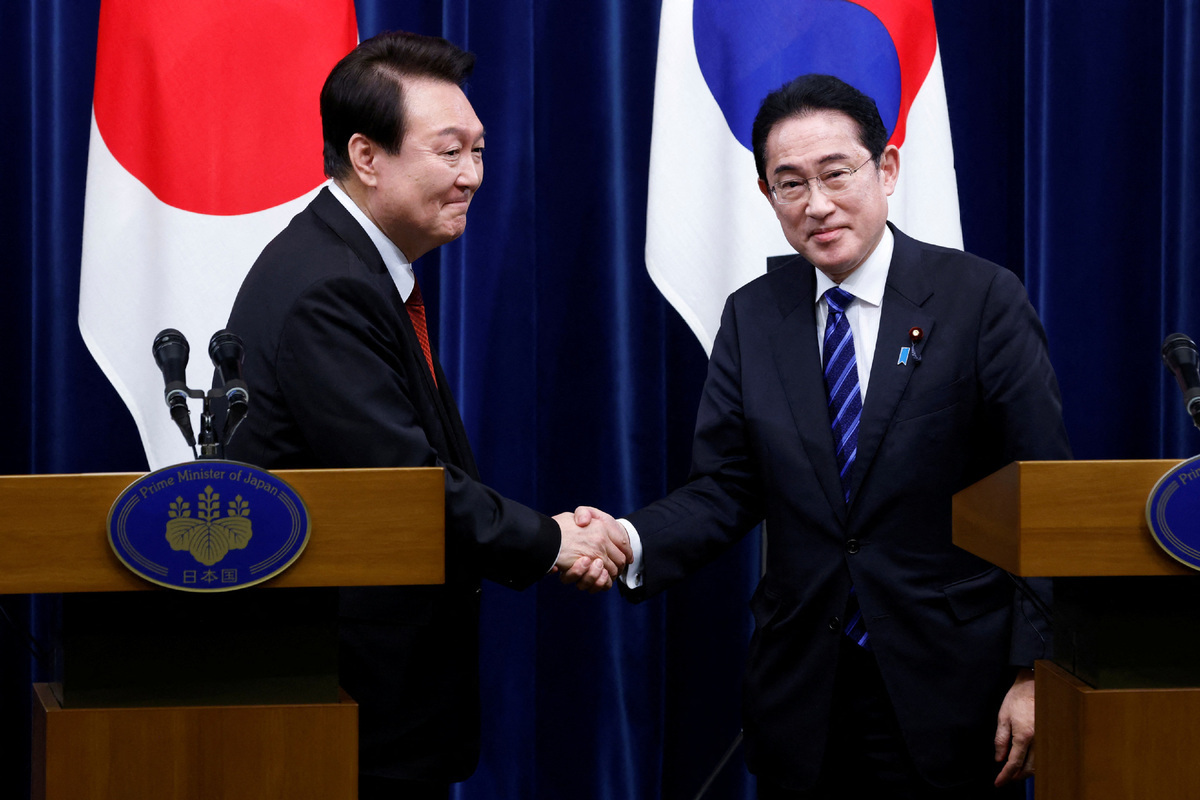Yoon's Japan visit can hardly realize reconciliation
chinadaily.com.cn | Updated: 2023-03-18 12:45

Editor's Note: The visit of Republic of Korea President Yoon Suk-yeol to Japan from Thursday to Friday was the first by a ROK president for 12 years. How will the visit reshape ROK-Japan ties? Two experts share their views with China Daily’s Zhang Xi. Excerpts below:
ROK’s compromise not art of diplomacy
The two-day visit came after Seoul announced a proposal last week to settle a wartime forced labor dispute with Japan using money mainly from ROK companies instead of from Japan. Although the plan was welcomed in Tokyo, polls showed that it is generally unpopular in the ROK.
Diplomacy is the art of compromise. However, the ROK’s compromise on the compensation plan for the victims of wartime forced labor does not reflect President Yoon Suk-yeol’s wisdom as a diplomat, nor does it show the art of diplomacy.
The ROK’s intention to pay compensation out of its own pocket to achieve reconciliation with Japan is considered by the ROK public to be a humiliation. In fact, the compensation proposal is a compromise between the victims and the aggressors that will downplay Japan’s war responsibility and whitewash its history of aggression. The compromise will acquiesce to provocations by Japan’s right-wing forces on history and help Japan break out of the post-war system.
The compromise may help the ROK establish a temporary detente with Japan, but it will not result in a long-term historical reconciliation.
First, the compromise by the victims can hardly awaken the conscience of the perpetrators. The ROK’s proposal cannot change right-wing force’s denial of Japan’s history of aggression, and will only contribute to Japan’s historical nihilism.
Second, the compromise will divide ROK society. According to a survey, nearly 60 percent of the people in the ROK oppose their government’s compensation plan, saying that it is a “humiliating diplomacy”. The next ROK government is likely to reject the plan, and the two countries’ relations will be strained again.
Third, although from the perspective of the United States, the ROK’s compromise promotes its reconciliation with Japan, facilitating the forming of an “Asian NATO” and a “Chip Four Alliance” that will serve Washington’s “Indo-Pacific strategy” to contain China, the structural contradictions between Japan and ROK, such as the issue of comfort women and their territorial dispute over the Dokdo islands, which are called Takeshima by Japan, remain major obstacles to any significant improvement of Japan-ROK relations.
Yin Xiaoliang, a professor at the Institute of Japanese Studies, Nankai University
Can ROK, Japan break from the past?
Historical issues are coming in the way of reconciliation between the ROK and Japan. The past often has a bearing on national sentiments and a country’s foreign policy. However, a country may choose not to give priority to historical issues in a certain period of time.
For the ruling Yoon Suk-yeol administration, it is more important to pursue the ROK’s national interests than demand Japan’s apology for forced labor and “comfort women” during World War II that have long plagued ROK-Japan ties. Although the ROK’s nominal GDP per capita is expected to exceed Japan’s this year, economic interests remain ROK’s priority. Japan still enjoys obvious competitive advantages over the ROK in the fields of key manufacturing materials and components, and the vertical division of labor between the two sides has not completely changed.
Therefore, companies in the ROK suffered economic losses because of the trade dispute between the two countries. The ROK realized this even though the huge investments made by the ROK’s earlier Moon Jae-in government in the localization of key industrial components and materials had made little progress. The chip industry is an important pillar of the ROK’s economy and the country must reach a compromise with Japan as soon as possible to avoid greater harm.
Further, the Russia-Ukraine conflict has made the ROK realize the importance of strengthening its security alliance. For the ROK, the Democratic People’s Republic of Korea nuclear issue is still a threat, so the ROK must improve ties with Japan due to its geographic significance. Besides, the growing rivalry between China and the United States and the intense situation in Northeast Asia also make it difficult for the ROK, as an ally, to make choices.
In addition, the Yoon Suk-yeol government is trying to recalibrate its global role, describing itself as a “global pivotal state”, as it needs external help, especially from the US, a country that keeps pushing for a compromise between Japan and the ROK.
History is an important pillar of national political identity. The ROK’s main opposition Democratic Party and many ROK groups have strongly rejected the plan worked out by the government to resolve the issue of wartime forced labor with Japan, in which the Foundation for Victims of Forced Mobilization, affiliated with the ROK’s interior ministry, will pay damages and interest on arrears to the plaintiffs who won three lawsuits in the Supreme Court in 2018. They have called it “submissive diplomacy”.
The opposition not only reflects partisan strife but also public mood. However, many young people in the ROK are tired of criticizing Japan despite people’s dissatisfaction with the Yoon Suk-yeol administration’s response to the wartime forced labor dispute.
Japan, with the support of the US, is more powerful than the ROK, so the ROK has to make compromises in its national interest. The ROK and Japan may promote their relationship and lift economic barriers through this meeting.
Liu Litao, an associate professor at School of International Studies, Nanjing University.
























